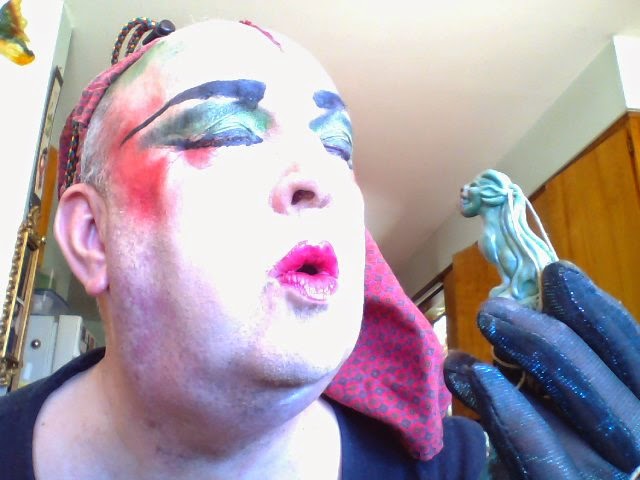some distant baying sound
To ye right, I am in ye Dutch churchyard on Flatbush Avenue in Brooklyn that inspir'd H. P. Lovecraft to write "The Hound."
"From one of the crumbling gravestones--dated 1747--I chipped a small piece to carry away. It lies before me as I write--& ought to suggest some sort of horror-story. I must some night place it beneath my pillow as I sleep . . . who can say what thing might not come out of the centuried earth to exact vengeance for his desecrated tomb?" (Lovecraft to Lillian D. Clark, 29 September 1922)
I love "The Hound," and think it a very effective tale--& it is so frustrating to be so lacking as any kind of literary critic that I fail either to understand that the story was not meant seriously, or to point out why indeed it was a serious early effort by E'ch-Pi-El.
"'The Hound' has been roundly abused for being overwritten; but it has somehow managed to escape most critics' attention that the story is an obvious self-parody. This becomes increasingly evident from many literary allusions and also from such grotesque utterances as 'Bizarre manifestations were now too frequent to count.' And yet, the story is undeniably successful as an experiment in sheer flamboyance and excess, so long as one keeps in mind that Lovecraft was aiming for such an effect and was doing so at least partially with tongue in cheek." (S. T. Joshi, Notes on "The Hound" in THE CALL OF CTHULHU AND OTHER WEIRD STORIES, Penguin 1999, pg. 378)
Is it so obviously a self-parody? I have not found anything in Lovecraft's correspondence that suggests he considered it such, and his latter dismissal of the story as an artistic failure seems to indicate that it was meant as a piece of serious fiction, else why would Lovecraft consider it a failure? In a letter to Derleth from February 16, 1933, Lovecraft refers to "The Hound" (and "The White Ship") as "unutterable crap." In other letters to Derleth he refers to it as "my miserable old tale." In a letter to Derleth of September 26, 1929, Lovecraft writes: "There is a quality of cheap melodrama--extravagance, floridity, unrestraint--in my style which needs ironing out, although it has decreased of itself since my 'Hypnos" & 'Hound' period." This statement surely suggests that the writing of "The Hound" was as sincere an effort as "Hypnos," a story that no one thinks is self-parody. If the tales prose was meant to be unrestrained and flamboyant, Lovecraft would not then criticise the story for it being so.
To Clark Ashton Smith, October 17, 1930:
"Enclosed is The Hound, as requested, although I consider this one of the poorest jumbles I have ever produced. It was written in 1922, before I had begun to prune down the verbal extravagances of my earlier prose. There is too much sonorous rhetoric & stock imagery, & not enough substance, in this piece of junk."
So, no -- it is not obvious that the story is self-parody--just the opposite.
For me, the narrative style works perfectly; for the tale is told by one who has suffered a profound shock of horror, by one who is close to suicide. Thus the fevered prose, reflecting the narrator's mental state, is exactly right. I find much poetry in the prose, such as in the opening paragraph:
"In my tortured ears there sounds unceasingly a nightmare whirring and flapping, and a faint, distant baying as of some gigantic hound. It is not a dream--it is not, I fear, even madness--for too much has already happened to give me these merciful doubts. St. John is a mangled corpse; I alone know why, and such is my knowledge that I am about to blow out my brains for fear I shall be mangled in the same way. Down unlit and illimitable corridors of eldritch phantasy sweeps the black, shapeless Nemesis that drives me to self-annihilation."
Is that paragraph overwritten? I find it exactly right, a perfect opening to a tale of dark Gothic horror. The poetry of "sounds unceasingly" and "unlit and illimitable" is beautifully effective. The paragraph tells us everything we need to know about the emotional state of the person who will tell his tale. (I say "his," as most assume that the narrator is male; but in my sequel to the story, I have transformed Lovecraft's narrator into a woman).
Perhaps I am wrong, blinded by my adoration of the story, and thus cannot see what is "obvious" to others--that the story is a young Lovecraft mocking his style. Why so serious an artist would do so at such an early period of his writing career (the story was not written for publication, as Weird Tales was not yet in existence when Lovecraft wrote the story; but it was one of the first tales that he submitted to that periodical), I fail to comprehend. Perhaps some of y'all can educate me?




"His latter dismissal of the story as an artistic failure seems to indicate that it was meant as a piece of serious fiction, else why would Lovecraft consider it a failure?" I've also felt that this contradicts the "parody" theory. I think you're absolutely right!
ReplyDelete